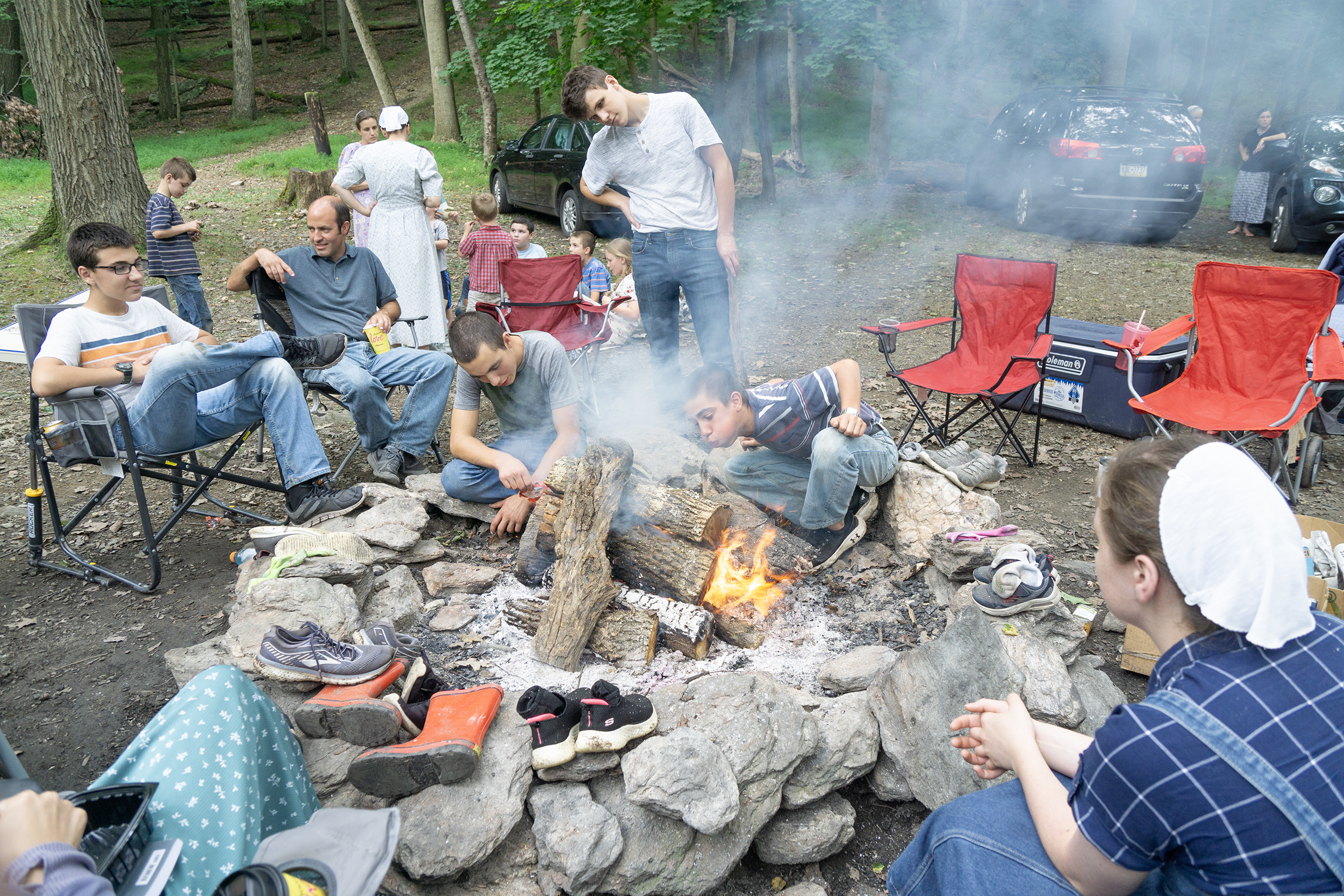A bee attack. A tree branch crashes into the ground near the campfire. Rain. Chiggers.
The annual family camping trip.
Two weeks ago, instead of camping at the river as we did the last two years, we rented a primitive campsite at Muddy Run Park in southern Lancaster Country. Not a tiny campground campsite. Instead, this campsite is on a remote hillside surrounded by trees and next to wetlands, without any other tents or RVs in sight. There’s a spring, a creek, and two bridges. (We could still hear the 372, but you can’t have everything.)

It was the perfect place for a group of forty people to camp. When my nephew arrived, I couldn’t resist quoting Abraham. I walked up to the truck and waved my hand at the sprawling woods around us. “The land is before you, Austin. Choose any spot you wish. Well, as long as no one else has a tent up there yet.”
I have twenty-nine nieces and nephews, ranging in age from 6-months-old to 23-years-old. Camping is the ideal vacation for large families— the boys had plenty of room to battle in the woods with wooden swords, while the girls braided each other’s hair. Everybody loves wading in the creek.

The first evening, I had one of the toddlers, Adam, down with me at the creek while the older boys were exploring the wetlands. Suddenly, 9-year-old Josh, began screaming. He ran over the wooden bridge and toward the campsite. “Help! Help!”
I picked up Adam and followed, both of us trying to figure out what the hollering was about.
“Take his shirt off!” yelled Dad. Josh had stepped in a bees’ nest. His mother and brother counted eight bee stings.
Later, with toothpaste applied and Benadryl swallowed, a subdued Josh sat at the campfire ring, warning about the dangers of bees.
His boy cousins weren’t daunted: they went back to the nest, threw a rock, and ran.
Some of the older cousins disapproved. Beriah said, “If you anger bees, they will fly in ever-widening circles until they find you.”
“What if they’re murder hornets?” said Austin. “I’ve heard they memorize your face and come looking for you. But that might be internet nonsense.”
Happily, no else got a bee sting for the rest of the weekend and after a good night’s rest, Josh was back to normal.

The next morning, we had a rain shower and everyone huddled underneath the camping canopy. (The canopy worked much better while camping than at the beach.) Poor Mom and Dad found out their twenty-year-old tent has a leak.
After the rain stopped, some of us hiked around the lake and others went boating.
All weekend we feasted on campfire food. Marshmallows, hot dogs, stuffed hot peppers, and even bananas roasted on sticks. Traditional mountain pies and breakfast mountain pies made with tortillas.
Saturday evening was my turn to cook. I prepared a Low Country Boil, something I have wanted to do for years. I got the recipe from the cookbook Hope’s Table (it’s sometimes called a Frogmore Supper.)
Low-County Boil is a one-pot meal, best prepared outdoors. I borrowed a propane burner to do the cooking— I wasn’t going to try this meal for so many people over a campfire.
You bring water, salt, and Old Bay seasoning to a boil, add potatoes, and boil for 10 minutes. Add kielbasa, boil another 10 minutes. Add sweet corn (cut into thirds), boil 3 minutes. Add onions, boil 2 minutes. Finally, add shrimp, and cook until the shrimp is pink, about 3 minutes.



Above the hill was a meadow. The first evening, some of us walked up and saw twenty-three deer in the twilight. The next evening, Hannah and I walked through the meadow in the dark, so we could see the lake at night.
Sunday morning most of us were sitting around the campfire ring when a big branch came crashing down a few feet behind Shiloh’s chair. The tree wasn’t dead, but the branch clearly was.
“No problem,” said one of the boys, grabbing the branch and breaking it into pieces over his knee. “The tree knew we needed more firewood.”
“Next time it should drop it right into the campfire ring.”
“Let’s not get too picky.”
A few days after camping, I learned that some people had gotten chiggers during our time in the woods. This confused me at first, because I thought they meant jiggers, which I’ve only heard about from missionaries.
Turns out they’re two different things. Chiggers are mites found in hot, humid weather in parts of the US. Their bites itch. Jiggers are fleas found in tropical and subtropical regions (not in North America) and they sound much worse than chiggers.
Camping in the jungle would take things to a whole new level.
But for us, camping at Muddy Run can be exciting too.


That was a great weekend! Thanks for the article!
You’re welcome! It was sweet to see how much Eva enjoyed camping.
Good times and good memories! Not to mention a new appreciation for the comforts of home afterwards! 😃
Home always feels wonderful after a few days in the woods!